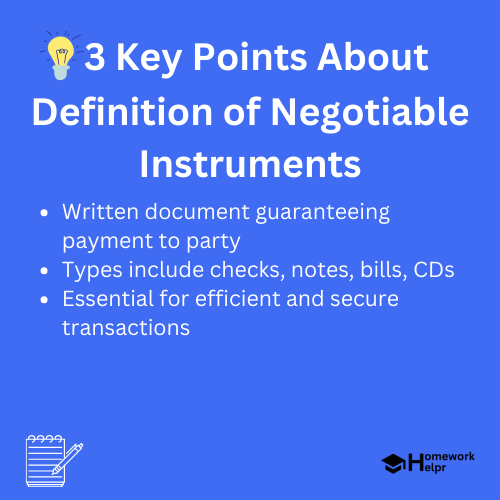📝 Summary
In finance and commerce, negotiable instruments are crucial written documents that guarantee the payment of a specific amount of money to a designated party, either on demand or at a future date. They include various types such as checks, promissory notes, bills of exchange, and certificates of deposit. Key characteristics include transferability, an unconditional promise to pay, legal enforceability, and a specific sum of money. While they enhance trade efficiency, credit creation, and security, risks such as fraud, counterfeiting, and non-payment exist. Understanding these instruments is essential for navigating modern finance effectively.
Understanding Negotiable Instruments
In the world of finance and commerce, negotiable instruments play a crucial role. But what exactly is a negotiable instrument? A negotiable instrument is a written document that guarantees the payment of a specific amount of money to a designated party, either on demand or at a specified time in the future. These instruments are not just simple contracts; they are legally recognized tools that facilitate transactions. They can be transferred from one person to another, which adds to their functionality and flexibility in financial dealings.
Types of Negotiable Instruments
Negotiable instruments can be categorized into different types, each with its own characteristics and uses. The major types include:
- Checks: A check is a written order instructing a bank to pay a specific amount from the check writer‚’ account to the person named on the check.
- Promissory Notes: This is a written promise by one party to pay a certain sum to another party at a future date.
- Bills of Exchange: This is an order from one party to another to pay a third party a specified amount of money on a specific date.
- Certificates of Deposit: These are time deposits offered by banks, which yield a fixed interest rate over a specified term.

Key Characteristics of Negotiable Instruments
Negotiable instruments possess certain essential characteristics that define their nature and differentiate them from other financial documents. These include:
- Transferability: They can be transferred from one person to another by endorsement or delivery.
- Unconditional promise to pay: They represent a clear commitment to pay a specific amount without any conditions attached.
- Legal enforceability: They are recognized by law, offering legal protection to the holder.
- Specific sum of money: They always state a specific amount that must be paid.
Definition
Endorsement: The act of signing a document that allows the transfer of rights to another person.
Unconditional: Without any conditions or limitations.
Importance of Negotiable Instruments
Negotiable instruments serve as vital instruments in facilitating trade and commerce. Here‚’ why they are so important:
- Efficiency: They streamline the process of transferring money, making business transactions quicker and easier.
- Credit Creation: By being transferable, they create credit opportunities for businesses and individuals.
- Security: They can be considered safer than cash since they can be traced and are authenticated through banking systems.
- Legal Framework: Negotiable instruments have a strong legal framework, which means disputes can often be resolved in court.
💡Did You Know?
Did you know that the first recorded use of negotiable instruments dates back to ancient Mesopotamia, where clay tablets served as written promises of future payment?
Risks Involved with Negotiable Instruments
While negotiable instruments have several advantages, it is essential to recognize the risks involved as well. Some of the notable risks include:
- Fraud: There is a risk of fraud if the instrument is forged or altered.
- Counterfeit: Counterfeit negotiable instruments can lead to financial loss.
- Non-payment: If the issuer fails to pay, the holder may face financial difficulties.
- Legal Complications: Disputes can arise regarding the legitimacy and enforceability of the instrument.
Definition
Counterfeit: Something that is made to look like something else, often to deceive.
Forger: A person who illegally replicates a document with intent to deceive.
Examples of Negotiable Instruments in Everyday Life
Negotiable instruments are used widely in financial transactions. Here are a couple of practical examples:
Example
One common example is a check. For instance, if you receive a paycheck from your employer, that check is a negotiable instrument allowing you to deposit it into your bank account or cash it at a specific location.
Example
Another example is a promissory note. Suppose you lend money to a friend and they provide you with a promissory note stating they will pay you back within three months. This note is a legal document that ensures they will repay you as agreed.
Conclusion
In conclusion, negotiable instruments are essential components of the modern financial system. They provide a reliable means for transferring funds and facilitate various transactions in our daily lives. Understanding the different types and characteristics of these instruments can empower individuals and businesses to navigate the financial landscape more effectively. In this fast-paced world of commerce, being well-informed about such financial tools can enhance one‚’ ability to make sound financial decisions.
As students or budding professionals, recognizing the role of negotiable instruments in finance could open doors to numerous opportunities in understanding business processes and secure one’s financial future. So, keep exploring and learning about these valuable financial documents!
Related Questions on Definition of Negotiable Instruments
What are negotiable instruments?
Answer: Negotiable instruments are written documents that guarantee the payment of a specific amount of money to a designated party, facilitating financial transactions.
What are the main types of negotiable instruments?
Answer: The main types include checks, promissory notes, bills of exchange, and certificates of deposit, each serving different financial purposes.
Why are negotiable instruments important?
Answer: They streamline transactions, create credit opportunities, provide security, and have a robust legal framework for resolving disputes.
What risks are associated with negotiable instruments?
Answer: Risks include fraud, counterfeiting, non-payment, and legal complications surrounding their legitimacy.
